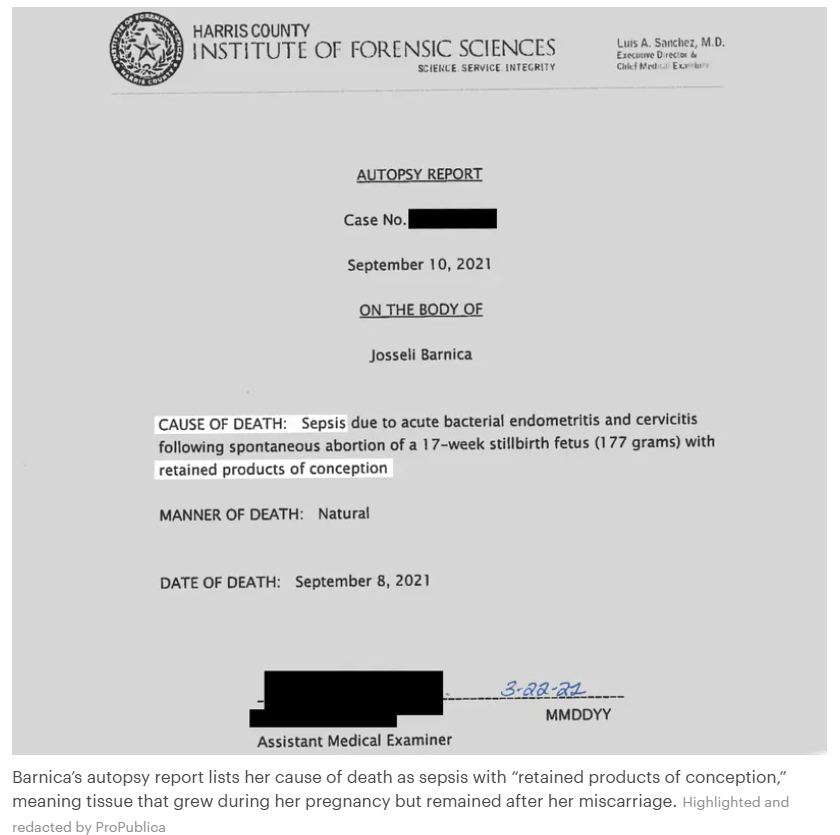Does Texas require doctors to wait until there’s no heartbeat to intervene in emergencies? (Josseli Barnica)
[This article is a transcript of “Does Texas require doctors to wait until there’s no heartbeat to intervene in emergencies?” courtesy of volunteer Ben Tomlin. If you’re interested in volunteering to transcribe more of our content, please complete our volunteer survey.]
This video is also available on Twitter/X, Facebook, Instagram, and YouTube.
Okay, new ProPublica article, “A Woman Died After Being Told It Would Be a ‘Crime’ to Intervene in Her Miscarriage at a Texas Hospital.”
This is the story of Josseli Barnica: she had a very wanted pregnancy, she was experiencing an inevitable miscarriage at 17-weeks, and she went to a Texas hospital, and they said that they could not intervene until there was no longer a heartbeat, and this delay was a major factor in her eventually getting an infection that killed her.
As an aside, I will say it is very frustrating trying to parse truth from fiction in these articles, so for example, in this ProPublica article about Barnica, they talk about Amber Thurman and Candi Miller and claim that they died because they didn’t get access to legal abortions and timely medical care, and they don’t mention that Amber Thurman did access legal abortion and Candi Miller didn’t access timely medical care because she never even attempted to.
They repeat claims about Texas legislation increasing infant and maternal deaths. Infant mortality rates did not increase in Texas. There were more infant deaths because there were more infant live births and some percentage of infants died, and there were more infant live births because the Texas Heartbeat Law meant that thousands of infants who would have otherwise been aborted ended up being born.
The maternal deaths claim is even more egregious. That link in the screencap article goes to the NBC article claiming that maternal deaths skyrocketed after the Texas Heartbeat Law, but if you look at the article, their data show that, in fact, the Texas heartbeat law went into effect in September of 2021, and from 2021 to 2022 maternal deaths decreased. But ProPublica repeats these things as if they’re credible, and then we have to read through this article knowing that a lot of the things they’re saying are definitely not true and trying to figure out what is true.
In any case, Barnica, she has a 17-week wanted pregnancy, she’s experiencing an inevitable miscarriage, she goes to the hospital, and they tell her they have to wait until there is no heartbeat. They wait for 40 hours. Once when they can no longer detect a heartbeat, they finally induce labor and terminate the pregnancy. Curiously, after that, though, they discharge her after eight more hours, and then even though the bleeding continues, they tell her that that’s expected.
[Post-transcript edit: Propublica also reported “Barnica’s autopsy report lists her cause of death as sepsis with ‘retained products of conception.'” In other words, her medical team (1) didn’t sufficiently monitor her (discharged after 8 hours), (2) dismissed her concerns about ongoing symptoms, and here (3) didn’t verify a complete miscarriage. It’s difficult to see the argument that she got a lethal infection from the medically unwarranted 40 hour wait for treatment, but not from the retained products of conception they didn’t notice or take care of for days afterward.
This is unfortunate for two reasons: the first one is they did not need to wait until there is no heartbeat to intervene; the law does not require that, and I will talk about that in a second, but the second reason is that even after they did intervene and terminate her pregnancy, they weren’t apparently concerned anymore and they discharged her, and then even when she contacted them to say that she was concerned, they said that they weren’t. And they didn’t catch her infection soon enough, and they didn’t treat her infection soon enough. There’s nothing in the Texas heartbeat law to explain why they wouldn’t monitor her more carefully or respond to her concerns more immediately.
So what does the Texas abortion law actually say? They outlaw abortions, but they make exceptions for medical emergencies, and they define medical emergency as “a life-threatening physical condition aggravated by, caused by, or arising from a pregnancy that, as certified by a physician, places the woman in danger of death or a serious risk of substantial impairment of a major bodily function unless an abortion is performed.”
ProPublica does acknowledge that Texas law makes exceptions for medical emergencies, but they claim that they don’t define medical emergencies and they further claim that the law doesn’t account for the possibility of a future emergency–even a few hours into the future. That doesn’t make a lot of sense, though, because the law says that it’s a condition that could cause serious risk of substantial impairment, and the whole concept of risk is possibilities in the future.
Elsewhere, the law talks about how it’s up to the doctors’ reasonable medical judgment if there’s a medical emergency. The side that advocates for abortion rights will argue that doctors aren’t sure whether or not someone else will consider their judgment “reasonable medical judgment.” But that’s difficult to believe in situations like this because ProPublica almost makes the point themselves. In this article, they talked about how they interviewed something like a dozen medical professionals and everyone said that this was egregious, that it was horrific, that they, of course, should have intervened, that it’s standard of care. You will find that both pro-choice and pro-life doctors will talk about how intervening in this situation is obvious and should be done because it’s a medical emergency. If that’s not reasonable medical judgment, what is?
The other side will argue, “Okay, well, maybe all doctors everywhere would agree that this was a medical emergency, but they’re still afraid to say that that’s reasonable medical judgment because what if an attorney doesn’t agree with them and prosecutes them for intervening when a woman could die?”
Note, though, and ProPublica mentions this, that no doctor in Texas or any of the other states that have passed pro-life laws has been prosecuted for intervening in a medical emergency. In fact, so far no doctor has been prosecuted at all in any regard related to abortion.
Still, despite the fact that this was clearly a medical emergency, that the law is designed to allow for medical emergencies, that every medical professional they talked to said that they should have intervened, and that doctors have not been prosecuted at all anywhere for proceeding with an abortion in a medical emergency, despite all that, if it’s still not very clear, ProPublica talks about how specifically in Texas, since this time, lawmakers and the medical board have issued further guidance talking about how premature rupture of membranes counts as a medical emergency and medical emergencies do not have to be imminent in order for someone to intervene.
Other states have followed suit in similar ways, and some of them have also clarified that none of this is meant to apply to contraception and that this is really just about making sure that elective abortion, which is the destruction of healthy embryos and fetuses carried by healthy woman when there was no medical emergency involved whatsoever, that was the overwhelming majority of abortions prior to Dobbs, that is what they want to outlaw, and they’re not trying to outlaw actual medical care in medical emergencies.
Take note, though, no matter how many times and how many ways and how clearly these lawmakers and other policy-setting authorities say “this is not meant to prevent you from intervening in medical emergencies, you can intervene in medical emergencies,” the other side will always say it’s confusing and scary. No matter what we say. That’s because the people fighting for abortion access are not interested in working with the pro-life side to make sure that women can always access emergency care and that everything is very clear and that doctors are not afraid. That’s not what they’re going for. They’re going for using alleged confusion and fear to say that we cannot regulate abortion.
Note that, internationally, even for countries that are considered pro-choice, they often have gestational limits at the national level earlier than this case. This case is 17-weeks. They often have limits at 12-weeks, at 15-weeks, whatever, and you don’t hear these stories about how it’s so confusing and doctors are all living in a climate of fear.
The American pro-choice movement has a lot of incentive to claim that it is not possible to teach doctors or train doctors or guide doctors in when something is an actual medical emergency and when you’re just performing an abortion electively.
Post-transcript edit:
ProPublica reports that Barnica’s autopsy listed her cause of death as sepsis with “retained products of conception.”

In other words, her medical team didn’t
- verify a complete miscarriage (a complete expulsion of fetal remains and all other pregnancy tissue)
- sufficiently monitor Barnica (they discharged her after only 8 hours), and
- take her concerns of ongoing symptoms seriously.
It’s difficult to see the argument that Barnica got a lethal infection from the medically unwarranted 40 hour wait for treatment, but not from the retained products of conception that went unnoticed and untreated for days afterward.
If you appreciate our work and would like to help, one of the most effective ways to do so is to become a monthly donor. You can also give a one time donation here or volunteer with us here.


